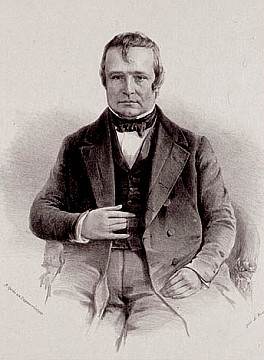Sir Louis-Hippolyte La Fontaine (1807-1864)
Sir Louis-Hippolyte Ménard dit LaFontaine 1st Bt., Prime Minister of Canada East
He was born at Boucherville in Lower Canada, a grandson of another politician,
Antoine Ménard dit Lafontaine (1744-1825) who was first elected to the Legislative Assembly of Lower Canada in 1796. Trained as a lawyer, Louis entered politics in 1830 and supported Papineau and the Parti Canadien. But, after their failed Rebellion against the British in 1837 and with the union of Upper (Ontario) and Lower (Quebec) Canada in 1841, he recognised the need for political reforms. In 1848, as a Liberal Reformer, he was asked by Lord Elgin to form a government with Robert Baldwin and they became known as the "Fathers of Responsible Government". He fought to restore the official status of the French language that had been abolished with the Union Act and passed bills abolishing the old Seigneurial System of landowning carried over from the French Regime and granting amnesty to the exiled leaders of the 1837 Rebellion. These bills drew the ire of the British Loyalists and in protest a group of them burned down the Parliament in Montreal and attacked the La Fontaine family home, described in its history: Maison La Fontaine. After a brief spell in Toronto, Louis retired back home to Montreal in 1851. Two years later, he was appointed Chief Justice of Canada East and in 1854 he was created a Baronet by Queen Victoria (which became extinct on the death of his son). In 1855, Pope Pius IX made him Knight Commander in the Order of St. Sylvester.
Antoine Ménard dit Lafontaine (1744-1825) who was first elected to the Legislative Assembly of Lower Canada in 1796. Trained as a lawyer, Louis entered politics in 1830 and supported Papineau and the Parti Canadien. But, after their failed Rebellion against the British in 1837 and with the union of Upper (Ontario) and Lower (Quebec) Canada in 1841, he recognised the need for political reforms. In 1848, as a Liberal Reformer, he was asked by Lord Elgin to form a government with Robert Baldwin and they became known as the "Fathers of Responsible Government". He fought to restore the official status of the French language that had been abolished with the Union Act and passed bills abolishing the old Seigneurial System of landowning carried over from the French Regime and granting amnesty to the exiled leaders of the 1837 Rebellion. These bills drew the ire of the British Loyalists and in protest a group of them burned down the Parliament in Montreal and attacked the La Fontaine family home, described in its history: Maison La Fontaine. After a brief spell in Toronto, Louis retired back home to Montreal in 1851. Two years later, he was appointed Chief Justice of Canada East and in 1854 he was created a Baronet by Queen Victoria (which became extinct on the death of his son). In 1855, Pope Pius IX made him Knight Commander in the Order of St. Sylvester.









